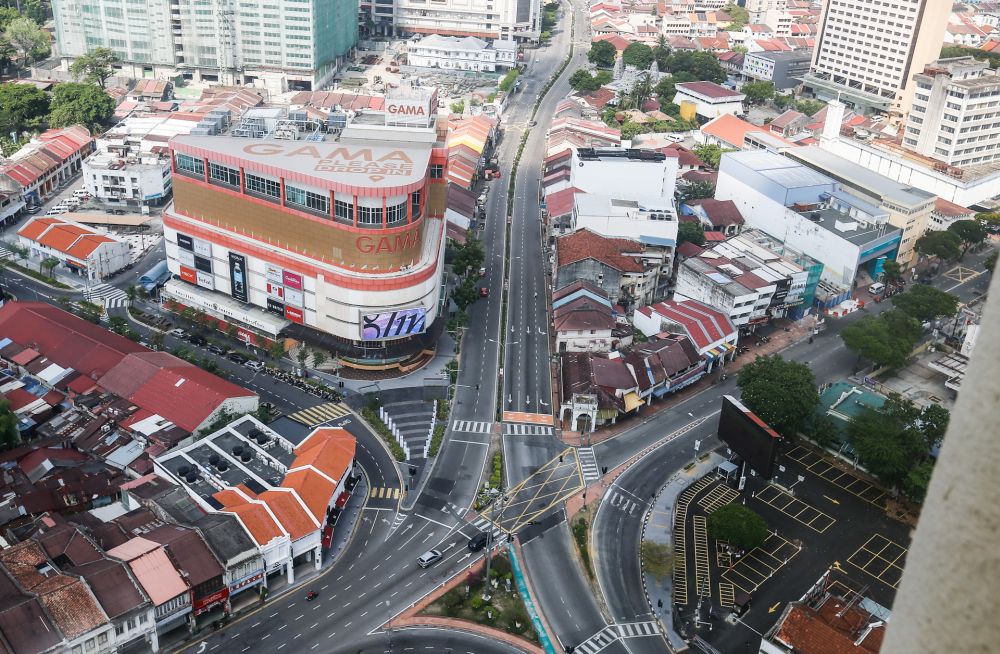KUALA LUMPUR, Apri 23 — The commercial property market in Penang, Johor and Sabah are expected to remain in the doldrums as weak sentiments prevail for the remainder of the year, according to a Knight Frank Malaysia survey.
The Regional Commercial Real Estate Investment Sentiment Survey (RCREISS) 2020 for Penang, Johor and Sabah highlighted that the economic toll from the Covid-19 pandemic continues and has yet to be calculated, and recovery, when it comes, will be a welcome relief.
“Without a doubt, investors are adopting the ‘wait and see’ approach as the local and global economies screeched to a halt amid the pandemic,” the survey said.
Knight Frank Penang executive director Mark Saw said the industrial sub-sector will undoubtedly continue to be a beacon of Penang’s economy.
“We also see rising interest in the office sector while a wave of branded residences emerging with hotel services is also a bright sector for Penang. Amid the doom and gloom, there are still opportunities to explore,” he said.
The Penang office market sees rising interest due to its relatively healthy level of supply and commendable occupancy rate and with limited incoming supply, this sector has become the bullseye for some investors and developers.
However, Saw said there may be some pullback to the co-working segment in the immediate term preceding the lifting of the movement control order (MCO) as there will be reduced desire for clients or members to congregate and interact face-to-face in one location.
“Post-Covid-19, co-working space with its unique selling points offering flexibility, hassle-free and low set-up cost is expected to continue attracting small companies and self-employed individuals,” he said.
In Johor, since the Covid-19 pandemic, investors are more cautious and defensive in the commercial property market, in particular the office and hospitality sub-sectors, with the logistics and industrial segment standing out as the most encouraging sub-sector there.
Knight Frank Johor branch head Debbie Choy said they anticipate that REITs will resume their search for similar assets post-Covid-19 as demand continues to remain strong within certain localities.
Knight Frank continues to receive active enquiries on industrial-type opportunities.
“The outlook for the state’s logistics sub-sector remains upbeat supported by the presence of three seaports, namely Port of Tanjung Pelepas, Johor Port and Tanjung Langsat Port as well as the Senai International Airport,” she said.
The healthcare sub-sector in Johor has been growing steadily with the completion and expansion of more private medical facilities.
The year 2019 saw the completion of three hospitals, namely Columbia Asia Tebrau Hospital, KPJ Bandar Dato’ Onn and KPJ Batu Pahat while KPJ Puteri Specialist and KPJ Kluang are currently under expansion.
Choy said Johor’s proximity to Singapore creates demand from foreign patients due to the favourable currency exchange rate and quality of medical services offered.
The 2020 survey also revealed that interest in healthcare investment is not limited to hospitals offering medical treatment but also to other alternative investments focusing on wellness such as retirement villages and senior living.
“Circa 45 per cent of the survey respondents who are already investing in Johor are exploring such alternative concepts,” she said.
The outlook for the healthcare sub-sector appears to be promising. Over 50 per cent of survey respondents foresee higher yield and returns in 2020 compared to the previous year.
Meanwhile in Sabah, the pandemic has disrupted the thriving tourism industry and its related services, when the state government announced the suspension of all direct flights from China and South Korea.
Knight Frank Sabah executive director Alexel Chen said the implementation of the MCO and travel bans subsequent to that coupled with the plunge in crude oil prices and lower CPO prices have further dampened market sentiment.
“In light of the current global crisis, there is an urgent need for relevant stakeholders (including the authorities) to diversify targeted tourist catchments and products in order to affirm the sustainable growth of the industry,” he added. — Bernama



















